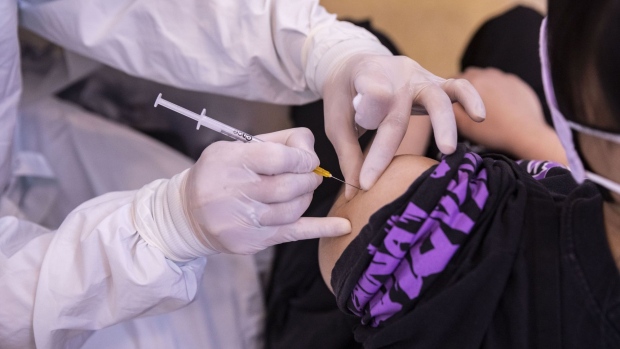Oct 26, 2021
Pfizer Says Lower-Dose Vaccine for Small Kids Could Also Work for Big Kids
, Bloomberg News

(Bloomberg) -- Pfizer Inc.’s lower-dose Covid-19 vaccine for kids under 12 appears to offer protection across the board, company officials said, and the drug giant may look into offering lower doses for teens who now get the adult dose.
A scientific advisory panel to the Food and Drug Administration is deliberating Tuesday on whether to recommend the vaccine, which Pfizer makes with parter BioNTech SE, for 5- to 11-year-olds. If cleared by regulators, it would make a Covid-19 vaccine available to all school-age children for the first time.
The proposed pediatric dose is 10 micrograms, or a third of the adult Pfizer dose everyone 12 and older currently receives.
Paul Offit, a member of the advisory panel and a pediatric infectious-disease specialist at the Children’s Hospital of Philadelphia, said he’s been fielding questions from parents of 11-year-olds who want to know if they should wait until their child is 12 to get the larger dose. Pfizer’s study of the shot for younger children identified three vaccinated kids who got mild breakthrough infections. Two were 10 years old and one was 11.
William Gruber, Pfizer’s senior vice president of vaccine clinical research and development, said the breakthrough cases are likely related to greater chance of exposure, as kids in the upper range of the clinical trial tend to socialize more.
“We are confident the dose works well across the entire age group,” he said.
Pfizer data indicated the pediatric dose is about 91% effective and a separate FDA analysis found the benefits of the vaccine outweighed the risks.
Older Kids
Arnold S. Monto, the acting FDA advisory committee chair and an epidemiology and global public health professor at the University of Michigan, asked what would happen to the antibody response and side effects if 12- to 15-year-olds receive the lower dose.
A 10-microgram dose might provide an antibody response for children 12 to 15, as they demonstrated higher responses that conferred a higher level of efficacy in the trial testing the 30-microgram adult dose, Gruber said.
“We have some possibility of looking at that in the future, but we don’t have that data today,” he said. But that change likely wouldn’t happen until the pandemic ends, he said. “The key goal right now is obviously providing protection with a safe and effective vaccine to get ahead of the pandemic.”
Vaccine doses tend to be based on age rather than height and weight because they don’t circulate in the bloodstream the way a medication does. Instead, vaccines are designed to create the strongest possible immune response at the smallest amount possible, to yield the fewest side effects.
©2021 Bloomberg L.P.